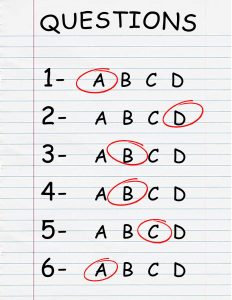
If you're a non-English speaker looking to work or study in an English-speaking country, then you'll likely have to take the test of a foreign language (TOEFL). And if you're confused about how and when to take the test, then have no fear.
We'll walk you through both how to decide between TOEFL test dates and how to make a study schedule. Let's get started!
When Are TOEFL Test Dates?
There are roughly 60 TOEFL test dates each year, and you'll be able to register for test dates up to four months in advance. Though test centers give the TOEFL (sometimes known as TOEFL iBT) throughout the year, test dates only extend three to four months out for most test centers. You won't be able to see test dates for most centers more than four months away from any given date. Additionally, different test centers offer different exam dates, so just because one location is offering the TOEFL on a certain day doesn't necessarily mean another is.
TOEFL test dates are only on Fridays, Saturdays, and Sundays. Most test centers will offer the test at least once or twice a month, though some only offer the test once every two months. How often your test center gives the test depends on their funding and on how popular the test is in your country, so double-check with your test center to see your available TOEFL test dates.
By clicking on the link above, you'll be able to enter a location and timeframe and see what TOEFL test dates are available. Below is a screenshot of TOEFL test dates and locations for Sydney, Australia for May and June 2021.

Within those parameters there are four test dates, and you can click on each one to expand it and see the exact location, time, and cost:

You can take the test as many times as you want to, but you must wait at least 12 days between tests. Check the test-date schedule for your testing location. Do take note that these test dates may not be completely accurate, so it's best to register and find your nearest testing center for the most accurate TOEFL exam dates.
The price of the test will vary depending on the country in which you take it, but will typically fall into the 160 - 300 US dollar range. Always double-check on the ETS website so that you know how much each TOEFL will cost for you.
How to Pick the Right TOEFL Test Date for You
If you're taking the TOEFL as part of a school application, you'll need to schedule your TOEFL exam date around your application deadlines. Most undergrad or grad school applications are due either December 1st or January 1st, but always check the deadlines for your individual schools. For instance, some schools allow international applicants to submission applications later (in March or April).
Also take note that some schools accept test scores like the SAT after the application deadline, but other schools will not. So if your application deadline is January 1st, it's best to assume that the school wants to have every piece of information (including your TOEFL score report) before or on January 1st.
TOEFL scores take ten days to get reported online, but 7-10 days to be delivered by mail in the United States, and as much as 4-6 weeks to be delivered outside the US. It's best to take the TOEFL:
- Three weeks prior to applications if you're applying to US schools,
- Or two months prior to application deadlines if you're applying to schools outside the US.
Though taking the test this far in advance may seem conservative, it's to make absolutely sure that your universities receive your scores in time. Better to take the test a little early than to have your application denied because your scores were too late!
Setting a TOEFL Testing Schedule
Now that we've looked at some of the basic facts about TOEFL dates, let's discuss how to create a timeline for studying, taking the test, and getting the scores into your universities of choice before deadlines. The exact schedule I've outlined here won't work for every application, so use it as an example and make the adjustments necessary for your own applications.
In order to make any test-taking schedule, it's a good idea to work backwards from your application deadlines. That way, you can see how much studying you need to do and how many times you can (or should) take the TOEFL.
Step 1: Find Your Application Deadline
Whether you're planning to take the TOEFL just once or multiple times, it's important to know the last possible date you can take the test before deadlines. Of course, you'll always be able to take an earlier test, but knowing the cutoff will give you the flexibility to make any changes.
If, for example, your application deadline is January 1st and you're applying to a school in the US, then subtract three weeks to find your last possible test day. This means that your final possible test date to take a TOEFL is on or before December 17th.
If you're application deadline is January 1st and you're applying to a school outside the US, you'll have to subtract approximately two months from your application deadline so that your scores arrive in time. This means your final possible TOEFL testing date is on or before November 4th.
Step 2: Make a Score Goal
Most universities require their applicants to hit or exceed a certain score on the TOEFL for admittance. Unlike the SAT or ACT, you do not need to "show off" by getting as high a score as you can on the TOEFL—if you reach the cutoff point for your school, then that's all that matters. After that, you can be satisfied and turn your attention to other parts of your application.
Each university has its own cutoff score, but the most common score universities want you to earn on the TOEFL is 100 points. Just remember that your schools may want a little more or a little less, so be sure to always look up the requirements for your specific schools. But as a general rule of thumb, 100 points is a good score to shoot for. So keep this number in your head as you study for the TOEFL.

Step 3: Take a TOEFL Practice Test
In order to get a general idea of how much you'll need to study for the TOEFL, it's a good idea to take a practice test. That way, you can see where your current areas of strength and weakness are and see how the test works before you take the official TOEFL.
The creators of the test are ETS.org, and it's best to use their source materials for your practice tests. Though other companies do their best to replicate the test structure and test questions of a real TOEFL, the creators of the test simply have more experience with the TOEFL. You can take an ETS practice test online for $45.95, or you can purchase one of the official TOEFL books, which include access to practice tests. Check out our guide to learn what the best TOEFL practice books are!
Again, you'll be able to find other practice tests and practice questions online, but they (unfortunately) won't be as accurate as the ones you have to pay for through ETS. These practice materials aren't written by the same people who make the test and so will not as accurately reflect the TOEFL you'll eventually take.
Step 4: Calculate the Hours You'll Need to Study
Now it's time to compare your practice test results and your TOEFL goals. How far away were your practice test scores from your score goal?
As a general rule, it takes approximately 6-8 hours of studying English to earn one point on the reading, listening, and writing sections, and about 15 hours of speaking English to earn one point on the speaking section. You'll notice that speaking takes twice as many hours of studying to improve as the other three sections. This is because most students have had much more practice with reading, listening, and writing in English and very little practice speaking it.
To figure out a study plan, subtract your score on your TOEFL practice test from your score goal. Then calculate the approximate number of study hours you'll need to put in to reach your goal. (Remember that it takes longer to improve your speaking section score, so prioritize appropriately.)
If you don't have much time before your TOEFL date but you need to improve by several points, you may want to look at the number of hours you can put in to improve each section. If you prioritize your study time by section, you can reduce the total number of hours you spend studying.
For example, let's say your score is currently: 25R, 23L, 21S, 23W, with a total of 92 points. You know that many schools have a cutoff of 100 points, so let's say you want to earn 8 more points total. If you simply aimed to improve each category by 2 points (27R, 25L, 23S, 25W) you'll likely have to study: 2(6) + 2(6) + 2(15) + 2(6) = 66 hours.
Now trying to improve each section equally may not be very practical, because it takes much longer to earn points on the speaking section. Instead, you may find that you want to aim for higher scores on the reading, listening, and writing sections, and spend less time on the speaking section. For instance, if you still wanted to earn 100 points, your score goals could be: 27R, 26L, 21S, 26W. This would mean that you increased your reading score by 2, your listening score by 3, your speaking by 0, and your writing by 3. Now your study time is: 2(6) + 3(6) + 0(15) + 3(6) = 48 hours. In the end, you've still earned 100 points total, but you'll have saved yourself almost 20 hours of studying.
Keep in mind that these study hours are guidelines for the average student and you may find that it takes you more or less time studying per section. Make your study schedule with these guidelines as a starting point, but be prepared to adjust if you find that you improve at a different rate.

Step 5: Make a Weekly TOEFL Study Plan
Look at your daily and weekly schedules and see how many hours a week you can spend studying for the TOEFL. Even if your TOEFL date isn't for several months, you'll still want to try to budget at least 4-5 hours of studying English and 2 hours of speaking it each week. But don't panic if this seems impossible! Studying another language doesn't always have to mean textbooks and grammar drills. Surrounding yourself and paying attention to the English language—English movies, TV shows, books, or conversation—is just as important as sitting down and studying grammar and vocabulary.
Learning and retaining a language happens over time, and you can't really cram for it or just study for one or two hours a week. It's a good rule of thumb to study at least one hour each day and to speak English for an additional half an hour to forty-five minutes each day, four or five days per week.
If possible, try to schedule a test at least two months in advance. So if you study an average of six hours per week for eight weeks, you'll have studied 48 hours at the end of two months. At an average point improvement rate of six hours per point, you'll earn approximately eight points spread out over the reading, listening, and writing sections.
And if you speak an average of two hours per week for eight weeks, you'll have spoken for a total of 16 hours. At an average point improvement of 15 hours speaking per point, you'll earn approximately one point on the speaking section. In total, this gives you a total of nine points of improvement on the TOEFL in just two months.
Step 6: Anticipate Taking the TOEFL Test More Than Once
Practice tests will never completely emulate the experience of taking the real TOEFL, so it's a good idea to anticipate having to take the test multiple times before your application deadlines.
Try to budget the time and money to take the TOEFL twice (or even three times if you can manage it).
If you decide to take the TOEFL more than once, give yourself at least one month between test dates so that you can examine your scores, learn from your mistakes, and prioritize your studying. This means that it's a good idea to start planning and studying at least three months before your final TOEFL test date (or three months and three weeks before your application deadlines for US schools and five months for schools outside the US).
Sample TOEFL Test Dates Schedule
If your application deadline is January 1st and you're applying to a school in the US, then your test-taking schedule might look like this:
-
- Practice TOEFL: September 17th
- 1st official TOEFL: October 14th
- 2nd official TOEFL: November 12th
- 3rd official TOEFL: December 9th
- Application deadline: January 1st
If you only have two months before your test, then you'll likely only have time to take an official test twice. If that's the case, then your schedule will look more like this:
-
- Practice TOEFL: October 14th
- 1st official TOEFL: November 12th
- 2nd official TOEFL: December 9th
- Application deadline: January 1st

Review: Picking TOEFL Test Dates and Centers
The TOEFL is an important test for non-native English speakers, and it's crucial to know when and how to take it so that you can do your best. Though the amount of information surrounding the test can be confusing, just take it one step at a time.
Look up your country's TOEFL test dates and centers, work backwards from your deadlines, and adjust your study plan as you go. Soon be conquering your English, your TOEFL, and your applications. Good luck!
What's Next?
Want more information on how the TOEFL is scored? Check out our guide to learn exactly how the TOEFL is scored so you can maximize the number of points you get.
How can you prepare for the TOEFL? Practice tests are one of the best study tools out there, and we have links to all the best practice tests together in one place.
Once you've taken the TOEFL, how do you send your scores to schools? Learn the six tips you need to know for sending your TOEFL Scores.











